What’s the matter? Isopod got your tongue? Hey, it could happen. At least, it might happen if we don’t get good and scared by what’s happening in places like Chesapeake Bay (and, next week, your local cinema).
Watch this trailer for Barry Levinson‘s The Bay (opening November 2nd) and then read our exclusive interview with screenwriter Michael Wallach to protect your fleshy face-bits from internal consumption. You’ve been warned.
Zack Kushner: Hi Mike! Thanks for taking the time to correspond us about your new film The Bay.
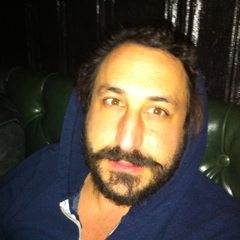
Mike Wallach, The Bay screenwriter
The Bay is Mike Wallach’s first produced screenplay, written in partnership with Oscar-winning director Barry Levinson.
How does one go from being a political analyst for the State Department to scripting a found-footage horror film with the man behind Rain Man and Wag the Dog?
Mike Wallach: Well, basically I got really lucky.
When I was at State, I was doing political polling in the Middle East, which the government essentially used to manipulate people over there, and I felt like shit. My girlfriend was calling me Leni Riefenstahl‘s research assistant.
I was going to meetings, like exactly the meetings you would imagine, where guys from Exxon would come in and talk to the guys running the Iraq war about the “excellent tactics” they used to distract people after the Valdez spill. Literally. It was mind-blowing. So I had to get out of there, or pretty much lose my soul (and my girlfriend). Meanwhile I was spending my lunch breaks scribbling out movie ideas every day at idiotic places like Quiznos and McDonalds.
So when I finally quit we moved to NYC and I started writing scripts (as much as I could between trying to make money) and trying to sell them. Eventually one of those scripts made its way to Barry through an editor I had met named Aaron Yanes. He gave them this script “The Politics of Heroin” I had written and Jason Sosnoff, from Barry’s office, called to say he liked it. He said that Barry was really pissed about the state of the Chesapeake Bay and he wanted to do a sort of political-horror movie about water pollution—did I want to give him some kind of pitch for it?
ZK: What was the process like, writing with Barry? How did that work?
MW: Well, he was taking pitches from writers at that point, and the idea was just kind of open. He wanted it to be found footage, but that was about all they knew. And I had never gotten a call like this before. Frankly, I had sort of assumed I was not gonna make it in Hollywood…
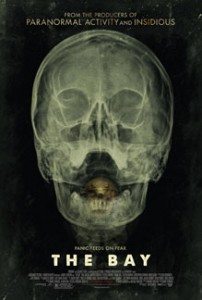 So I drank like 14 coffees and smoked a pack of cigarettes and wrote Barry a short story over the next two days about a young couple that comes across a dead town and has to piece together what happened from the footage they find laying around, only as they piece it together, they realize the town isn’t finished dying yet.
So I drank like 14 coffees and smoked a pack of cigarettes and wrote Barry a short story over the next two days about a young couple that comes across a dead town and has to piece together what happened from the footage they find laying around, only as they piece it together, they realize the town isn’t finished dying yet.
Barry liked it. We met. He sent me this incredible movie called JFK: 3 Shots That Changed America about the day Kennedy was killed, and he said, “Can we make it feel like this, like a documentary?”
And based on that conversation, I went back and started from the beginning. How did everybody die? How do we get inside what that would be like?
ZK: Once you got into production—and we understand that it was a very streamlined production—did the reality of filmmaking require any significant changes in the script? What did you learn from that process? Were there any big surprises?
MW: Oh hell yeah. Loads of stuff. Actually, I had had this kind of amateurish pseudo-artistic idea in my head that the movie would be done by moving from long shots to close ups over the course of the story, as we got closer and closer to the horror of what was going on. We had to throw that away the first day, because as Barry quickly pointed out, no one wants to see a bunch of long shots for an hour.
Then, there was building those jump out of your seat scares, which we all sort of love and hate, but which really have to be built out quite carefully when you’re on a set. Some of the ones I had written just weren’t coming off the page (though some were, awesomely).
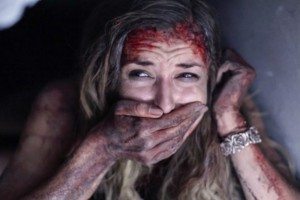 So I remember this one moment when Barry called me over, and said “Mike, we’re gonna need another scare.” And I had about an hour, because we were on a super tight shoot. And I didn’t have my cigarettes. So I asked the Assistant Director for a cigarette, cause he always had them. And he didn’t have them. So now I am really freaking out. But then it goes into the microphone from the A.D. “We need a cigarette for the writer.” “Check that, cigarette for the writer.” And a minute later the gaffer shows up with a pack of Marlboro’s and I took a long grateful drag on one, and the idea for the scare came almost right away. I really felt like a writer then! But of course, the big brain gem I had at the time was a very particular way for blood to drip on someone… Not exactly Tolstoy. But you learn what it takes to really build a scare, to build tension when you are forced to do it quickly.
So I remember this one moment when Barry called me over, and said “Mike, we’re gonna need another scare.” And I had about an hour, because we were on a super tight shoot. And I didn’t have my cigarettes. So I asked the Assistant Director for a cigarette, cause he always had them. And he didn’t have them. So now I am really freaking out. But then it goes into the microphone from the A.D. “We need a cigarette for the writer.” “Check that, cigarette for the writer.” And a minute later the gaffer shows up with a pack of Marlboro’s and I took a long grateful drag on one, and the idea for the scare came almost right away. I really felt like a writer then! But of course, the big brain gem I had at the time was a very particular way for blood to drip on someone… Not exactly Tolstoy. But you learn what it takes to really build a scare, to build tension when you are forced to do it quickly.
Anyway, there was a lot of stuff that changed and loads of stuff learned. There was this incredible mass poultry attack scene that got cut, some really funny improv stuff from the cast that made its way into the film… lots of great stuff.
ZK: From the pre-release press on The Bay, it sounds like the film is untraditional structurally. How was it working within a found footage scenario? Were there particular challenges or unexpected benefits?
MW: Yeah, its defintely untraditionally structured, but in a way, even untraditionally structured just means you are playing with the traditional structure, not breaking it. You can’t break it. If you break it, you’re making an art film, not telling a story. And we wanted to tell a story, just in a new way.
There are still three acts. There are still character arcs. There are just a bunch of them in a sort of scrambled environment so that it doesn’t feel rehearsed.
The idea of doing a found footage film where we are picking up like 30 or 40 different pieces of footage shot that day—you know from iPhones, security cameras, audio messages, internet video, patrol car cameras, etc.—was to make each piece feel real and not have them work together too easily. Otherwise it just wouldn’t feel authentic.
ZK: Can you share any original script ideas you’ve been working on? What types of stories do you find most compelling?
MW: Hmmm. I have an alien abduction movie that I just sold that I’m really excited about, because I think its very personal and intimate as an emotional experience, and extra freaky in that way because of it.
And I have this little gothic art-horror script about confusion that I have found myself obsessed with lately, but its best not to speak too much about it at this point…
I guess the scripts that really get us emotionally on the horror level are my favorite.
ZK: Anyone who knows Barry Levinson’s work knows he’s big on Baltimore. This film, however, despite its Maryland setting, is a fairly huge departure for him stylistically. Do you think he’ll make more genre pictures?
MW: I don’t think its impossible that he would make another genre picture, but its not likely. When we premiered The Bay at the Toronto International Film Festival at midnight to 1,400 screaming fans, who stayed up afterwards to nerd out on the movie and talk to him until 3 in the morning—I think he was pretty touched and surprised by the appeal of the horror crowd.
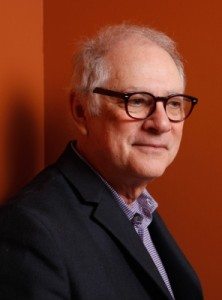
Barry Levinson
But my sense is that Barry doesn’t think in genre terms. He doesn’t like being forced into any genre at all on a story he’s telling, actually. There’s particularly a lot of pressure in the horror world to conform to convention. My sense is that Barry wants to deal honestly and truthfully with the issues in life that disturb or interest him. And he’s at the point in his career where he can do that.
ZK: What about you? Are you a horror fan? Is The Bay typical of what you hope to write going forward?
MW: Yeah, I’ve totally fallen in love with the horror world, though its not the only world I love. I am sort of a strange sell… I hate home invasion movies. I hate serial killer movies. I hate gore for gore’s sake. But The Bay is a GORY movie! I think if you google it you’re likely to see the word “grotesque” pop up more than anything else.
But I love horror and I love death!
I think reflecting on death is one of the great abilities of human beings. It’s one of the things that lets us grow spiritually and, perhaps, more insightfully than anything else. I love waking up from a nightmare.
And horror is real. I think a lot of people who love horror movies are sort of fucked up in a good sense. They know that horror exists on our planet and it needs to be out there on film. But at the same time, I think we are drifting towards a sort of psychotic break with ourselves. The way our interest in horror is reflected and then pushed on by film culture and slasher violence is, to me, one of the most disturbing trends out there. I’m trying to get my head around it, but I haven’t yet.
To me, it has something to do with whether or not there are real emotions and causes behind violence, or whether characters are just sort of violent for no reason.
ZK: There’s a serious ecological threat rearing its head in The Bay. I understand you didn’t mess around much with the underpinning science, except for turning the threat level up to eleven. No supernatural terrors. No crazed slashers. What can you tell us about what inspired The Bay? Should we be scared?
MW: Oh my god yes.
I did a ton of research for The Bay because I really wanted to ground the whole thing in truth. And the crap i discovered is ENDLESS. We are so fucked. It’s crazy.
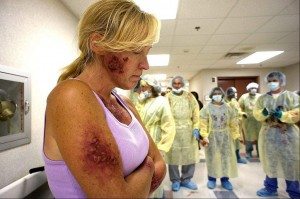 Remember this when you watch the movie: There is only ONE invented problem in the film (you’ll know it). EVERYTHING ELSE MENTIONED IN THE FILM IS 100% REAL. Google “tongue eating isopods,” “nuclear radiation in American waters,” “toxicity of American fish,” “Chesapeake Bay dead zones,” “chicken shit dumping,” and “sex change effects of Atrazine in water.” The list goes on and on…
Remember this when you watch the movie: There is only ONE invented problem in the film (you’ll know it). EVERYTHING ELSE MENTIONED IN THE FILM IS 100% REAL. Google “tongue eating isopods,” “nuclear radiation in American waters,” “toxicity of American fish,” “Chesapeake Bay dead zones,” “chicken shit dumping,” and “sex change effects of Atrazine in water.” The list goes on and on…
You know, one of the things that people say on the comment boards and stuff, is “Hey this would never happen, there’s no way a hundred people would die and we wouldn’t know about it.”
Really?
Have you heard of the Milwaukee Water Disaster? 100 dead. 200,000 people reported to the hospital. Have you seen the fisherman on YouTube that grew bark over his skin due to fungal mutations in the Pacific? What about farmers growing fibers out of their skin, possibly due to GMO mutations on cotton crops? It’s unreal what’s out there…
ZK: Do you think reality-based scenarios are more disturbing than fanciful ones?
MW: No not at all. I was terrified of Fire in The Sky which was ostensibly about alien abduction (a subject I do happen to love). I was terrified of The Shining, even though I don’t think little girls are going to follow me around on my Big Wheel. But we can all identify with being on that Big Wheel and imaging something really freaky out there. And we can all identify with hearing our parents argue when we were kids and just freaking out, getting scared. Hearing vibes that are freaky to us.
ZK: What makes a horror movie truly frightening? Which horror films have scared you the most severely?
MW: As I said, I hate home invasion movies, even though people do get their homes invaded. I hate serial killer flicks, even though the cops tell us there are serial killers everywhere. What I need from a horror flick is to locate the problem in the right emotional place. Fire In The Sky worked for me, not because of the aliens, but because of the fear of being traumatized and not being able to communicate that. They captured that really well in that film.
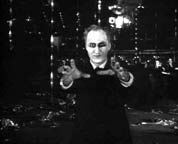
Carnival of Souls certainly looks creepy…
I really got into the old Carnival of Souls film, which has no gore, and we know isn’t real, because, for me, emotionally it felt real. To be lost, and scared, and not quite understand your life or why you do what you do, or why you feel alienated from people. That to me is very real.
I don’t think anyone is rightfully afraid of isopods eating their way out of our bodies. But my god, we should all be terrified of the fact that we have a society that has gotten to the point where we can’t drink the water. We are living in a nightmare.
And hopefully the way The Bay is cut and filmed, we can get the sense that when it does go overboard here and there, (and it DOES now, all the time) there’s not going to be any calling the doctor. It may be you who gets screwed. It may be me. It’s not gonna be up to us at that point.
ZK: Is there a film you remember most from your childhood—one that made the biggest impression on you? What was it about that film that resonates with you still?
MW: This is sort of cliche, but The Graduate. It had never occurred to me that anyone could put on film the bizarre mix of sexual and romantic and rebellious and cowardly and courageous feelings I had mixing in the pit of my stomach so precisely, and for such a long stretch of time.
I was blown away. That made me want to be a filmmaker.
I didn’t get into horror until much later, unfortunately.
ZK: What films do you think are vastly underrated? Forgotten gems you think everyone should see?
MW: Onibaba. Carnival of Souls. Ran. Pather Panchali. Really anything by Satyajit Ray. These are probably not great secrets, but they’re great movies.
ZK: Thanks Michael! We really appreciate you taking the time to speak to Stand By for Mind Control. Best of luck with The Bay and we look forward to seeing your name on screen in the future!
MW: Thank you!

Yikes, that footage of “Tree Man” is some serious WTF?!?!!?
Great interview! Only one question remains to be asked, Mike. What kind of influence do you think ‘The Bay’ is going to have in the Middle East?
great interview
Wow, honest interview, glad you didn’t lose your soul…